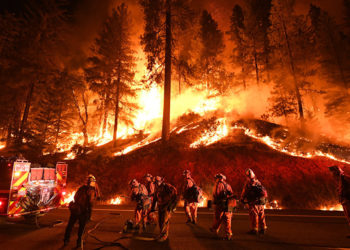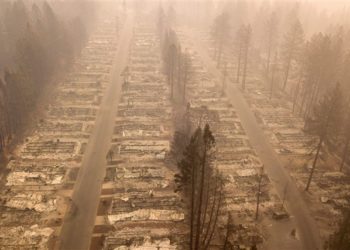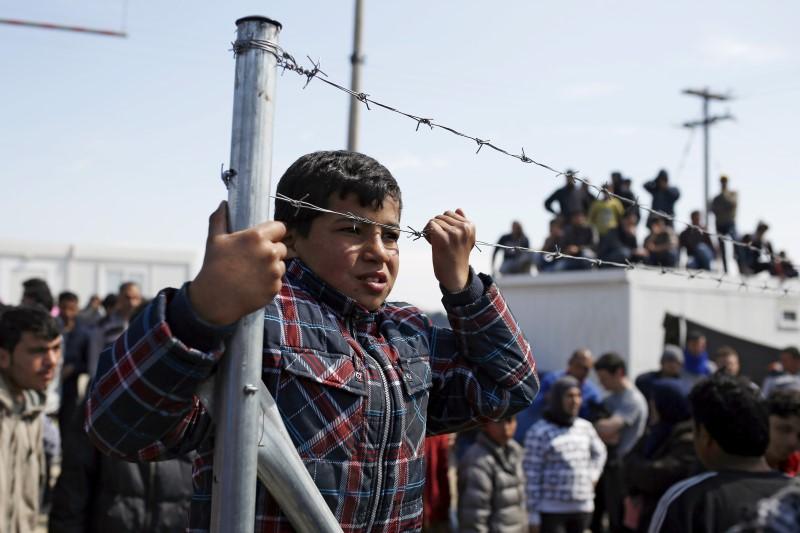Wildfires in California are increasingly common and severe with each passing year as global temperatures continue to rise due to climate change. Faulty power lines often catalyze these fires and in response, Pacific Gas and Electric, California’s largest power utility, opted to cut off power for millions of residents while faulty lines are repaired.
Some experts believe microgrids, a technology capable of localizing power distribution, could be a fix for California’s energy woes.
PG&E’s planned power outages in California have been extremely disruptive to the lives of those affected, impacting their ability to work, run their businesses, preserve perishable food, and keep their homes warm. In some cases, the outages put the health of elderly residents at risk.
Last week, the California Public Utilities Commission voted unanimously to order an investigation into the outages by PG&E to determine whether the utility prioritized safety and complied with CPUC regulations and requirements.
“The scope and duration of this outage was unacceptable,” California Governor Gavin Newsom wrote in a letter to the CPUC.
“It was the direct result of decades of PG&E prioritizing profit over public safety, mismanagement, inadequate investment in fire safety and fire prevention measures and neglect of critical infrastructure.”
The power outages in California represent a failure of PG&E to meet the most basic of energy needs to their customers. According to Executive Director of the Microgrid Institute Michael Burr, Microgrids have the potential to avoid some of the problems of the traditional power distribution model.
In the traditional model for power distribution, power plants generate electricity and send it over long distances via transmission lines to various localities.
Microgrids are different because they are smaller, more localized, and self-sustaining power systems, which can operate independently of other areas.
The operational independence of microgrids is significant because they can continue to generate power even if other parts of the larger grid are shut down.
“Normally microgrids are connected to the utility grid but in an outage or utility outage or some other scenario … you can separate from the grid and operate independently,” Burr told The Globe Post.
“It’s a type of backup power system but it’s more than that. A backup power system only operates when there’s a utility outage. A microgrid operates 24/7, 365.”
Microgrids are also complementary to renewable sources of energy such as solar and wind which is another reason the technology may be appealing a state like California, where residents are acutely feeling the impacts of climate change.
Most existing sources of renewable energy today are tied to the larger power grid and won’t work unless that grid is up and running.
“Probably 99 percent of the solar systems that have been installed in PG&E’s territory … are grid-tied systems,” Burr said. “When there’s a utility outage they go down and…you cannot use the power from your [solar] system … unless it’s been integrated to do that. That’s what a microgrid is. That’s what a microgrid does.”
According to Queens University Associate Dean of Policy Studies Warren Mabee, microgrids and renewables are similar in the sense that they are both more distributed and localized compared to the more centralized power distribution system that exists today.
“The nice thing about renewables is that they are already distributed,” Mabee told The Globe Post.
“You’ve got power generation on every building and around your communities. The distributed nature of renewables will lend itself well to microgrids because we don’t have to be sending power hundreds of kilometers away and it can be used relatively locally.”
The biggest obstacle for microgrids currently is the cost.
Burr explained bringing down costs is complicated because there are so many individual components, like battery storage and control systems, each of which comes with its own associated cost and “maturation rates.”
“Where [each component] currently is in its lifecycle is affecting what its costs are,” Burr said. “What we’re seeing is that … the costs are coming down and technologies are getting better and better over time.”
One of these components both Mabee and Burr mentioned was battery storage, which is important because it allows microgrids to transition quickly between being connected to the grid and being in what Burr called an “island mode” where it operates self sufficiently.
“Even solar power doesn’t perfectly mirror the peak usage throughout the day. So we need a lot of storage added onto that, and that’s really the crux,” ” Mabee said.
“California is one of those states that could do it because you’ve got the population, manufacturing, and you’ve got the know how … but if we don’t start doing it, the costs will remain high.”
More on the Subject
Dividends and Disaster: How For-Profit Utilities Threaten Public Safety


















